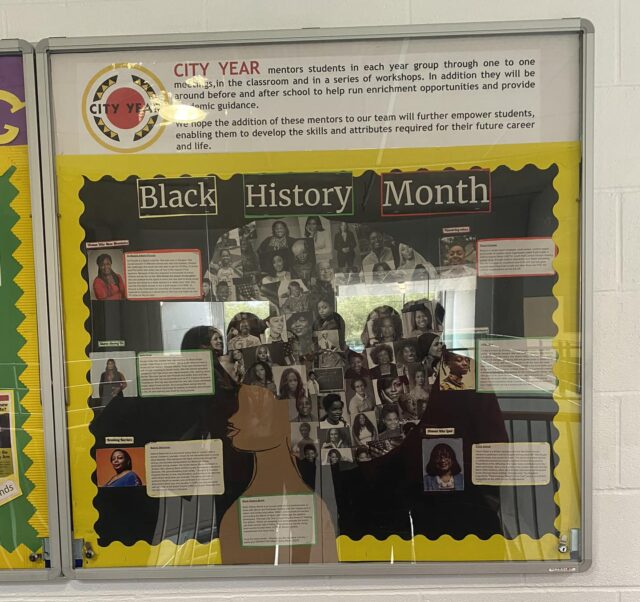Celebrating Black History Month 2023!

To celebrate the start of Black History Month 2023, and City Year UK’s championing of diversity, our City Year Mentors have been producing display boards in their schools, such as this one by Team Spirit. Additionally, London-based Impact Officer, Kimboshane Barnes, has written this blog post exploring the history of black female royalty, in line with the theme of #SalutingOurSisters.
Following the theme of this year’s Black History Month, #SalutingOurSisters, I wanted to highlight the history of our sisters and, in particular, black female royalty. It is often overlooked that black history does not begin with slavery, but includes royalty, the empowerment of women, and beauty – away from enslavement and oppression.
As educators, it is key that we inform young people of these lesser known facts and increase student knowledge around black history not just this month, but everyday. One pivotal piece of history is the African women leaders of our history: Mothers, Daughters, and Sisters. Here are just three of many queens who paved the way.
 Amina of Zaria, Nigeria (b.1533 – d.1610)
Amina of Zaria, Nigeria (b.1533 – d.1610)
Amina of Zaria was the first woman to become Queen of Zazzau, ruling in a male-dominated Hausa civilization. She was known as the Warrior Queen, recognised for her expansion of territory of the Hausa people of north Africa.
 Ana Nzinga of Mbande Ndogo, Angola (b.1583 – d.1663)
Ana Nzinga of Mbande Ndogo, Angola (b.1583 – d.1663)
Ana Nzinga was the ruler of the Mbundo people in modern day Angola, fighting for freedom and recognition. Ana was a politician, diplomat and military leader. Her great negotiation skills lead to the country’s independence, and limits around the trade of enslaved people.
 Yaa Asantewaa of the Ashanti Empire, Ghana (b.1840 – d.1921)
Yaa Asantewaa of the Ashanti Empire, Ghana (b.1840 – d.1921)
Yaa Asantewaa is believed to be a chosen queen, with such power comes great responsibility and Yaa Asantewaa fulfilled her role indeed. Her leadership, care for others and community approach allowed her to inspire other women around her to fight for a cause greater than herself.
These are the shoulders on which we proudly stand today, reaffirming the richness of black lineage. Many of these women ruled and served their countries during a time where women’s voices was insignificant in the Western world. However, they managed to create change in their time and continue to impact women in Africa and the diaspora. I invite you all to do your own research about black history in its fullness.
We at City Year acknowledge the outstanding impact black people have had in the UK and around the world.
– Kimboshane Barnes
Related stories
Back in April, we welcomed 4 new Student Support Leaders (SSL) to City Year UK, who are serving in our...
Read more about Introducing our new School Service LeadersLondon-based City Year Mentor Shaiza is taking on a brave challenge for a fantastic cause. This summer she’ll be raising...
Read more about Shaiza's fundraiserIn celebration of International Transgender Day of Visibility, our former City Year UK School Service Leader Dan, shares his experience...
Read more about Dan's storyBack to Impact Report 2022-23 Mariyah explains how she mentored, coached and tutored a Year 10 student, X, to believe...
Read more about Mariyah and X’s City Year story